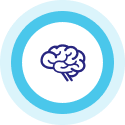A lot of concussions fly under the radar and go undiagnosed. Even a minor concussion can have lasting effects that may linger and worsen without proper treatment. Our free online concussion test can help gauge the severity of your concussion symptoms and provide recommendations for treatment.

CONTACT US
Book An Appointment
OUR SERVICES
View Our Brain Treatment Options
CONCusSION TEST
Frequently Asked
Questions
There are different types of concussion testing methods and screenings: online concussion tests, baseline concussion tests, post-injury concussion tests, and medical examinations.
An online concussion test will typically just evaluate the severity of the symptoms that you’re experiencing. A baseline concussion test will assess your brain function prior to getting a concussion and will compare those results to a post-injury concussion test. Lastly, a medical examination is always important with a concussion to assess the prevalence of any significant brain damage or internal bleeding.
It’s important to note that an online concussion test should never be considered as a substitution for seeing a medical professional or an actual concussion specialist. If you’ve recently suffered a blow to your head and think you might have a concussion, please see a doctor or a concussion specialist as soon as possible.
A concussion typically won’t show up on brain imaging tests unless there are severe structural changes or bleeding in the brain. If your concussion symptoms are severe, it’s strongly recommended that you go see a medical professional to schedule a CT scan.
Because concussions don’t show up on most medical tests, it’s important to see a concussion specialist if you’ve recently suffered from a traumatic blow to the head and are experiencing concussion-like symptoms. A concussion specialist can identify symptoms and provide the appropriate treatments for a speedy and effective concussion recovery process.
A baseline concussion test is an exam conducted by a trained health care professional or concussion expert that assesses one’s balance and brain function. Baseline testing generally takes place before the specific sports season starts to have a baseline to compare results to after an injury takes place.
If an athlete experiences a traumatic brain injury and has a suspected concussion, a similar test will be conducted to compare against the original “baseline” results.
Anyone who experiences a blow to the head or a whiplash-like head movement should be checked and tested for a possible concussion. Concussion testing will check your brain function after a head injury to evaluate the severity of symptoms in order to help create an effective treatment plan if necessary.
The earlier a diagnosis is made, the sooner you can start a recovery/treatment plan, and the sooner you can get back to feeling like normal.
It is estimated that 50% of concussion go unreported. This is particularly dangerous because the onset of concussion symptoms can vary from one person to the next and can appear days or even weeks after the initial injury.
Even mild concussions can have severe symptoms and can result in far-reaching health consequences – especially if not diagnosed or treated properly. Head injuries can lead to psychiatric disorders like anxiety, depression, memory issues and more.
If undiagnosed, concussion symptoms can continue for much longer than if diagnosed and treated. Also, if left untreated, the likelihood of experiencing another concussion is significantly greater and can be extremely dangerous with potentially permanent damage done to the brain.
The concussion recovery process varies from one person to the next. Factors like other health conditions, the number of previous concussions, and the severity of the injury can all impact the time that it takes to heal from a concussion.
With proper treatment and diagnosis, a majority of concussion symptoms can start to subside within 2 weeks. However, without proper treatment, the symptoms can last much longer and can be much more severe – that’s why it’s important to get properly diagnosed and to get treatment from a concussion specialist.



